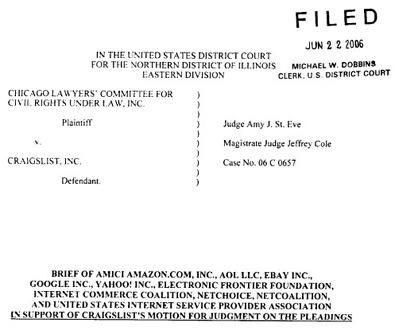Amazon, AOL, eBay, Google, Yahoo - 'In support of Craigslist'

A “Brief of Amici” was filed June 22, 2006, in the United States District Court for the Northeastern District of Illinois, Eastern Division, by ten leading Internet companies and organizations “in support of Craigslist” in the Chicago Lawyer’s Committee for Civil Rights Under Law, Inc. lawsuit against Craigslist, Inc.. The lawsuit alleges 100 discriminatory housing ads were posted at the craigslist Chicago site over a specified 6 month period. Craigslist’s defense is that it is entitled to broad immunity for third-party content. The ten companies and organizations that filed the brief in support of craigslist either facilitate the online publication of third-party content, as craigslist does, or advocate for interactive computer services providers:
- Amazon.com
- AOL
- eBay
- Yahoo!
- Electronic Frontier Foundation
- Internet Commerce Coalition
- NetChoice
- NetCoalition
- US Internet Service Provider Association
The companies assert in the brief:
Unlike predecessor media, these new media have, as their defining quality, the phenomenal capacity for almost anyone with a computer, from individuals to large businesses and other organizations, to disseminate virtually instantaneously vast quantities of diverse content that is then available to people around the globe.
As such, the Amici have a vital stake in the proper resolution of the issue presented by craigslist’s motion: whether providers of interactive computer services may be held liable for alledgedly harmful content that is made available through such a service but that originated with someone else. As craigslist explained in its opening brief… courts provides interactive computer service providers such as Amici with broad immunity from claims based on third-party content.
In layman’s terms, according to an announcement at craigslist posted by Jim Buckmaster CEO, craigslist, “craigslist Disputes "Fair" Housing Lawsuit”:
A group of lawyers is suing craigslist over a handful of allegedly discriminatory housing ads posted by our users, ignoring the fact that craigslist is not a publisher, but rather a community-moderated commons run by and for its users, who self-publish and manage their own ads and use a flagging system to police the site.
According to The National Law Journal report, “Online peers Stand Up for Craigslist in Lawsuit”:
Samuel Fifer, a lawyer at Sonnenschein Nath & Rosenthal in Chicago who represents the companies that filed the amicus brief, likened the law's protection for Internet companies to the laws that protect phone companies from liability for information passed on their wires.
According to craigslist:
These lawyers demand that we impose ill-conceived, mistake-prone, and potentially illegal controls on the craigslist community, which if adopted would actually reduce fair housing opportunity, while eroding important free speech and privacy rights. In reality, the craigslist community already excels at ensuring equal opportunity housing, and continues to improve in this regard, earning praise from fair housing groups. This lawsuit will likely be dismissed as groundless, but more importantly the craigslist community will be recognized for its exemplary record in promoting fair housing for all, while fully respecting each person's constitutional right to free speech and free association.
I asked Craig Newmark, Founder craigslist, for his reaction to the lawsuit and he stated: “no good deed goes unpunished.”
The brief concludes:
The Amici believe that the federal Fair Housing laws should have force in the online world. But as with other allegedly harmful content, any imposition of liability should be focused on the actual wrongdoers—that, is the people who originate the allegedly unlawful content. Subject to very narrow exceptions, Congress concluded that courts should not entertain claims that would impose liability on an online intermediary for its users’ communications. The court should reject the plaintiff’s tortured attempt to undo Congress’ decision.
